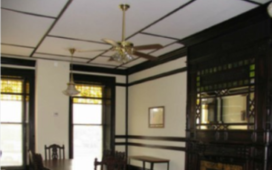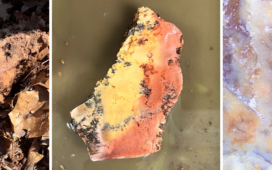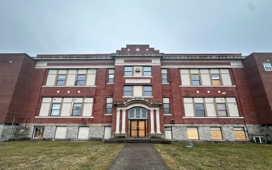Announcing the FY 2025 African American Heritage Preservation Program Awardees
The Maryland Commission on African American History and Culture and the Maryland Historical Trust have awarded 31 African American Heritage Preservation Program grants totaling $5,000,000 to numerous Maryland organizations for FY 2025. These grants offer assistance to organizations and private citizens in their sponsorship of projects involving acquisition, construction, or improvement of sites related to African American heritage. This year’s grant awards range from $10,000 to $250,000. The awardees are listed below, in alphabetical order by county.
Asbury Methodist Church ($193,717) – Annapolis, Anne Arundel County | Sponsor: Asbury United Methodist Church of Annapolis

Asbury Methodist Church was originally built in 1888 by one of Maryland’s oldest African-American congregations. Asbury’s congregation was founded in 1803 and included several hundred people, many of them enslaved. The church now hosts many community events, including a job re-entry program for those seeking employment after incarceration. Funding will support the replacement of windows and other window restoration efforts, masonry repairs, and door replacement.
Charles “Hoppy” Adams Jr. House ($250,000) – Annapolis, Anne Arundel County | Sponsor: Charles W. “Hoppy” Adams Jr. Foundation, Inc.
The Charles “Hoppy” Adams Jr. House project aims to convert the home into a historic house museum. Adams’ home, which served as a refuge for Black entertainers during segregation in Annapolis, will interpret the life of Hoppy Adams, his legacy, and African American life in Annapolis during Jim Crow. Funding will support the acquisition of an adjacent parcel, once owned by Adams’ parents, for redevelopment into a visitor’s center and parking area.
Frederick Douglass Summer House ($106,000) – Highland Beach, Anne Arundel County | Sponsor: Town of Highland Beach

The Frederick Douglass Summer House is a Queen Anne style frame dwelling that was constructed in ca. 1894 as a summer home for Frederick Douglass, who unfortunately did not live to see the project’s completion. The building is the oldest standing dwelling in Highland Beach, a municipality founded by African Americans in 1893. The house is currently used as a museum space for the Frederick Douglass Museum and Cultural Center. Funding will support structural improvements to the building.
Mt. Zion UMC Laurel ($180,000) – Laurel, Anne Arundel County | Sponsor: NST Collaborative, LLC
Located in the Bacontown Historic District, Mt. Zion Church was built in 1913 and has continually served the community since its opening. Funding will support pre-development costs for the construction of a space that highlights the community’s unique history by documenting, preserving, and promoting the African American heritage and lived experiences that contribute to the evolution of Bacontown.

The Harlem Theater ($243,000) – Baltimore City | Sponsor: AJOR Real Estate Group, LLC

The Harlem Theatre stands as the last first-run movie theater serving Black Baltimoreans. Opened in 1932 and built with an ornate Spanish-style interior and luxurious amenities, the theater drew record crowds during the height of segregation. The theater still serves as an important community hub, hosting youth theater groups and multi-cultural performances. Funding will support pre-development services to support future rehabilitation, as well as roof and window repair.
Cowdensville A.M.E. Church ($87,000) – Arbutus, Baltimore County | Sponsor: Friends of Cowdensville A.M.E., Inc.
The Cowdensville A.M.E. Church was constructed between 1904 and 1907, but its roots go back to 1857 within the free Black community once known as Crowden Town. The church has served not only as a place of worship but as a meeting place for civil rights groups in the mid-20th century. For many years the church hosted grief support groups, food and school supply giveaways, and neighborhood organization meetings. A complete rehabilitation was undertaken in the late 1990s to save the church from condemnation and demolition. Funding will support the repair of the narthex.

Asbury United Methodist Church ($186,000) – White Marsh, Baltimore County | Sponsor: Asbury, White Marsh United Methodist Church

Asbury United Methodist Church began as a meeting house in 1828 for enslaved and freed persons living in the White Marsh, Loreley, and Cowenton areas. The congregation worshiped in a log cabin until 1913 when the present frame church was built. In 1872, members of the Asbury United Methodist Church formed the Union of Brothers and Sisters of Ford’s Asbury Lodge #1 to meet the benevolent needs of community members and provide burial assistance. Funding will support replacing exterior rehabilitation of the church.
Biscoe Gray Heritage Farm – George Rice House ($50,000) – Prince Frederick, Calvert County | Sponsor: County Commissioners of Calvert County, Maryland
The Biscoe Gray Heritage Farm aims to continue its educational outreach by focusing on youth and providing them with an example of a 20th-century African-American-owned farm. The Homestead will highlight the Gray family’s success during Reconstruction despite racial discrimination, as well as African American roles in agriculture and farming through interpretive signage and themed walking trails/tours. Funding will support making the site and trails ADA-compliant.

Brooks Methodist Church ($77,000) – St. Leonard, Calvert County | Sponsor: Brooks United Methodist Church
While its 1968 building is more contemporary, Brooks Methodist Church serves a congregation that formed in the mid-19th century and may be the oldest African American Methodist congregation in Calvert County. The church also stands on the site of a segregated school that burned in the late 1880s. The congregation currently operates a food pantry, a voter registration site, and a rehearsal space for the congregation’s choir. Funding will support mechanical upgrades, accessibility improvements, and pre-development costs.
St. Paul Church ($240,000) – Denton, Caroline County | Sponsor: St. Paul Church Historical, Revitalization and Maintenance, Inc.

This project will transform St. Paul Church, built in the 1880s, into a community-based center to engage in conversations that uplift Denton’s African American community. The community center will facilitate an increased awareness of African American culture and history in Caroline County and statewide through educational seminars, literature, and cultural events. Funds will support cemetery conservation efforts, floor repair, foundation repair, and interior and exterior finishes.
Fairview Methodist Episcopal (now United Methodist) Church ($74,783) – New Windsor, Carroll County | Sponsor: Fairview United Methodist Church
For nearly 175 years, Fairview Methodist Episcopal (now United Methodist) Church and Cemetery has continuously served the Carroll County community since its foundation. The church was built by free African Americans who worked as farmers, stone masons, and carpenters. When the church was completed, services were held at night so both free and enslaved people could attend. Funding will support cemetery conservation efforts.

Elk Landing Hollingsworth House ($49,000) – Elkton, Cecil County | Sponsor: The Historic Elk Landing Foundation, Inc.

The Hollingsworth House was built sometime after a prominent Quaker colonist named Zebulon Hollingsworth acquired the property in 1735. After an 1848 fire, the house was remodeled to include an east wing and a front porch. The kitchen and slave quarters above it were likely a separate building until the remodel. The house will continue to be used as a living history museum, with grant funds assisting the restoration of the slave quarters and providing an opportunity to interpret the African American experience at the historic site.
Malone Methodist Episcopal Church ($250,000) – Madison, Dorchester County | Sponsor: Harrisville/Malone Cemetery Maintenance Fund, Inc.
Malone’s Methodist Episcopal Church is a single-story, gable-roofed church built in 1895. The church served the African American community that had grown in the area beginning in the late 18th century, as free-born families began to settle here and intermarry with the local enslaved population. The community has ties to Harriet Tubman’s family, including in-laws who are buried in the cemetery adjacent to the church. Funding will support a new foundation, masonry work, and roof rehabilitation.

Ebenezer African Methodist Episcopal Church ($195,000) – Brunswick, Frederick County | Sponsor: Ebenezer African Methodist Episcopal Church-Brunswick, Inc.
Ebenezer African Methodist Episcopal Church was established to serve the community in the early 20th century. Dr. William Henry Bell, a college professor who was formerly enslaved, founded the church along with other congregants. The current church was constructed in 1920. Funding will support accessibility improvements.
Asbury Methodist Church ($36,000) – City of Frederick, Frederick County | Sponsor: Asbury United Methodist Church of Frederick City

Located within the Frederick Historic District, Asbury Methodist Church is over 200 years old and has remained a pillar in the community. Prior to the Civil War, the church was a sanctuary where African Americans, some enslaved, were permitted to worship alongside white congregants and later, a place wholly their own. The church plans to raise funds to open a Child Development Center and provide scholarships to minority students. Grant funding will support a new interior ramp, two doors in their Child Development Center, and new gutters.
Quinn Chapel AME Church ($250,000) – City of Frederick, Frederick County | Sponsor: Quinn Chapel African Methodist Episcopal Church, Inc.
With a congregation that dates back to the 1790s, Quinn African Methodist Episcopal Church served as a safe house for the Underground Railroad and was used as a hospital during the Civil War. Later, the building housed one of the first schools for Black children in Frederick. Funding will support the repair and stabilization of the bell tower, structural support, and other building maintenance, helping the church continue its role as an educational resource for the public and extend its outreach.

Catoctin Furnace African American Cemetery ($150,000) – Thurmont, Frederick County | Sponsor: Catoctin Furnace Historical Society, Inc.
The Catoctin Furnace African American Cemetery is significant to American industrial history and the role African Americans played in the iron industry. Using DNA collected from cemetery burials that were exhumed in the late 1970s, a joint research project among Harvard University, 23andMe, and the Smithsonian Institute has identified more than 40,000 descendants of African American enslaved ironworkers at Catoctin Furnace. Funding will support the purchase of the cemetery property, which will pave the way for public access and interpretation of the site.

Hosanna School Museum ($225,000) – Darlington, Harford County | Sponsor: The Hosanna Community House, Inc.

The Hosanna School was built in 1867 to educate recently freed African Americans. A free Black man donated the land, the Freedman’s Bureau funded teachers and supplies, and the local African American community donated their supplies and labor to create the school. Now the Hosanna School Museum, the school is open to the public, highlighting history from slavery to Jim Crow and the years that followed. Funding will support accessibility upgrades.
Blandair, Slave Quarters ($250,000) – Columbia, Howard County | Sponsor: County Council of Howard County
The quarter built for people enslaved on the Blandair estate is a notable example of a double-pen, sawn plank building with a central double fireplace, dating to the 1850s. The building housed African Americans enslaved on the property, working in the house and on the farm, for over a century. Now part of a larger park, Howard County intends to restore the site and interpret the story of all people, free and enslaved, who lived at Blandair. Funding will support the rehabilitation of the quarters including roof, siding, and window repairs.

Mt. Gregory United Methodist Church ($236,500) – Cooksville, Howard County | Sponsor: Mt. Gregory United Methodist Church

Mt. Gregory was originally established in Cooksville in the 1867s as a place to educate African American children. The church was established on the site in the years that followed and both the school and church utilized the same building into the early twentieth century. A modest frame Gothic Revival church, constructed in 1898, still serves the congregation today as an active place of worship and houses a food pantry. Funding will support renovations of the lower level of the church building.
Barksdale Grocery Store and Tavern ($185,000) – Jessup, Howard County | Sponsor: BNCM, LLC
The Barksdale Grocery Store and Tavern was established around 1943 as a tavern. The tavern and later grocery store, along with an attached garage are simple concrete block buildings, with an important history. The original owner, Edgar D. Barksdale, operated several businesses onsite. Barksdale was the first person of color to obtain a liquor license in Howard County, and he managed apartments located on site, as well as a meeting hall (now demolished) that was integral to the social life of the local African American community. The general store was also among only a few African-American-owned grocery stores within the segregated community. Funding will support the rehabilitation of the building.

The Custom House ($232,000) – Chestertown, Kent County | Sponsor: Washington College
Dating back more than 275 years, the Custom House on the Washington College campus has what is believed to be an underground holding cell for enslaved people, a rare surviving feature from the trans-Atlantic slave trade. The house, now home to the Starr Center for the Study of the American Experience, hosts public events and will expand its community engagements to educate the public on local African American history. Funding will support framing, waterproofing of the chamber, and an archaeological investigation.
Mander House Museum ($247,000) – Worton, Kent County | Sponsor: Yvette Young
Congo “Mango” Mander purchased the Mander House property in the late 18th century after he gained his freedom from slavery. The house itself was built by Mander’s descendants, and the property remains in the Mander family today. Once developed, the Mander House Museum will tell the story of local African American freedmen and their contributions to Kent County before the Civil War, as well as residents who fought in the Union Army, like Congo Mander’s grandsons. Funding will support structural repairs, a new roof, and an overall conditions assessment of the building in advance of a full rehabilitation.
The Montgomery Chapel Cemetery ($10,000) – Clarksburg, Montgomery County | Sponsor: The Montgomery County Parks Foundation, Inc.

The Montgomery Chapel Cemetery is one of the last remaining places associated with the post-Emancipation African American community that called Hyattstown home. The cemetery was established in the late 1870s by the congregation of the Montgomery Chapel. Montgomery Chapel was demolished in 1982, leaving the cemetery as the last vestige of this African American enclave. Funding will support a GPR survey of the cemetery.
Button Farm Living History Center ($106,000) – Germantown, Montgomery County | Sponsor: The Menare Foundation, Inc.

Button Farm, located in Seneca Creek State Park, plans to continue renovations to the three main structures on the property. Button Farm has a living history center that provides a unique learning experience to the community and tourists. The organization works with descendants of enslaved people who founded the community after Emancipation and weaves their stories into programming. Funding will support a new roof for the pavilion, the completion of framing, electrical work, and windows for the farmhouse, as well as new gutters, window repairs, and electrical work on the barn.
Mt. Nebo AME Church ($50,000) – Upper Marlboro, Prince George’s County | Sponsor: Friends of Historic Mt. Nebo Preservation Corporation
Mt. Nebo African Methodist Episcopal Church is a rare surviving example of a rural AME church in Prince George’s County. Mt. Nebo served as an important place of respite for its congregants in the Jim Crow era. The church was constructed in 1925, replacing a log church that dated ca. 1877., and the cemetery on the property hosts burials from as far back as 1859. Funding will support the rehabilitation of the building for use as a community center.

Galilee United Methodist Cemetery ($24,000) – Mechanicsville, St. Mary’s County | Sponsor: St. Mary’s College of Maryland

Located in Mechanicsville, the Galilee Methodist Episcopal Church Cemetery was established c. 1880 on land purchased by the church – an African American congregation. The cemetery contains the remains of many congregants, including Civil War veteran J. T. Cully of the 9th United States Colored Infantry, which was established in nearby Benedict. Once conserved, the cemetery will provide a space for genealogical research and interpretation of the post-emancipation lives of African Americans in St. Mary’s County. Funding will support cemetery conservation and site mapping, fence repair, and the installation of interpretive kiosks.
Coulbourne and Jewett House at the Chesapeake Bay Maritime Museum ($242,000) – St. Michaels, Talbot County | Sponsor: Chesapeake Bay Maritime Museum, Inc.

The Coulbourne and Jewett House at the Chesapeake Bay Maritime Museum is a simple Victorian-style residence that was constructed c. 1875. In 1907, the building became the residence of William Coulbourne, who, along with his partner Frederick Jewett, were early African American entrepreneurs in the oyster packing trade and their business, the Coulbourne & Jewett Seafood Packing Company, later became the largest employer in St. Michaels. The entrepreneurs devised a grading system for crab meat that is still used by the seafood industry today. Funding will rehabilitate the building from the museum store into an education center focused on the lives of Black watermen.
St. Mark’s Episcopal Church, Lappans ($75,000) – Boonsboro, Washington County | Sponsor: St. Mark’s Episcopal Church Inc.
St. Mark’s Episcopal Church is a rural stone church constructed in Lappans in 1849. The church served local landowners, as well as the free and enslaved African American population, performing weddings, baptisms, confirmations, and burials for African American congregants from its founding. A stained-glass window in the church commemorates the significant role African Americans played in the history of the church. With the help of a professor from Hood College, the congregation is sharing its African American history with the public. Funding will support roofing, repointing, and electrical upgrades.

Tyree African Methodist Episcopal Church ($250,000) – Berlin, Worcester County | Sponsor: Tyree African Methodist Episcopal Church Incorporated
Located in Worcester County’s Germantown community, Tyree African Methodist Episcopal Church was constructed in 1915 and enlarged in the early 1990s. The original Gothic Revival portion of the building is wood-framed, cross-shaped, and displays tripartite colored-glass windows at the front façade. In addition to religious services, the church was used as a place for education prior to the establishment of the Germantown School, a Rosenwald School. Funding will support structural work to the foundation and original bell tower.
Freetown, Education, Research, and Cultural Museum ($250,000) – Snow Hill, Worcester County | Sponsor: Freetown Education, Research, and Cultural Center of Snow Hill, Inc.
The building that will be home to the Freetown Education, Research, and Cultural Museum is located in Freetown, a historically African American neighborhood on the edge of Snow Hill. The building was constructed in the late 19th century as a home in a community that served as a safe haven for people formerly enslaved at properties along the Pocomoke River. Funding will support rehabilitation of the building for the future home of the Freetown Education, Research, and Cultural Museum.

















